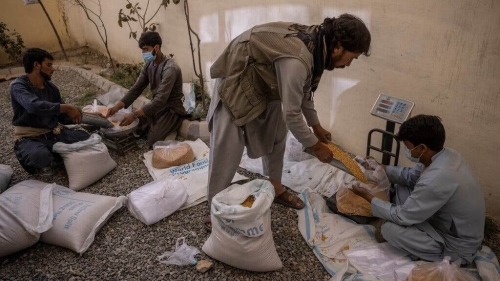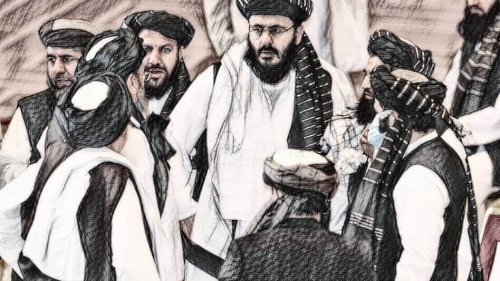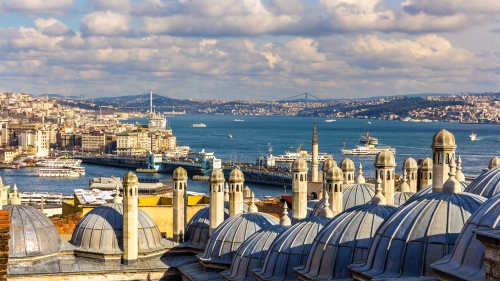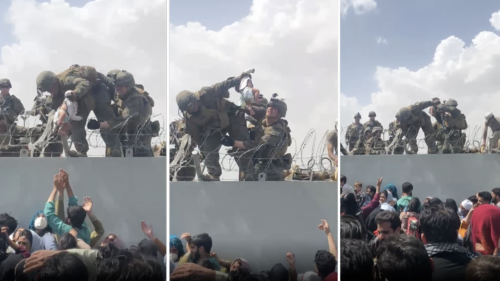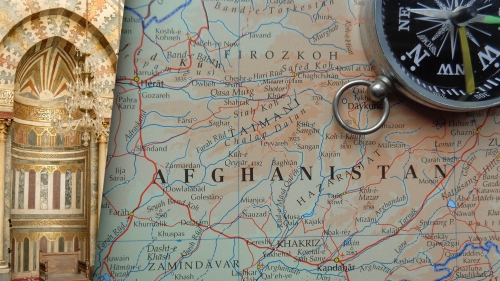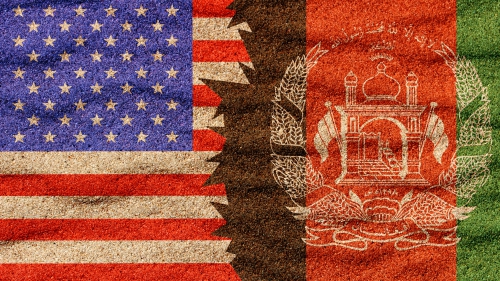Taliban: Completing a Task
A journalist friend asked this writer's opinion over the issue of the Taliban destroying the Buddhist idols. The response came naturally that God forbid if Prophet Ibrahim (peace and blessings be upon him) had not destroyed all the idols in the Kaaba, perhaps thinking that he had set the example, then his followers in our age might have taken upon them the completion of this task.
Humanity has been given one Message, the message of monotheism, and over the ages, this message was lost and garbled. The Maker of the original message dispatched His messenger to remind and reestablish the Message, voiding the distortion that had crept in uninvited. The Second Commandment is "You shall not make for yourself an idol." That commandment is reinforced in Deuteronomy 4:16: "Do not act corruptly by making an idol for yourselves." Unlike, Judaism and Islam, Christianity has tended to ignore the Second Commandment. This is why Christian art is full of religious painting and sculpture, and Judaic and Islamic art is not.Instead of reminding the world that both the Torah and the Bible disallow the crafting of idols, Dr. Muzammil H. Siddiqi, president of the Islamic Society of North America, however, declared that the "decision is un-Islamic," and the destruction of idols "will give a very bad name to Islam and will create hate against their people among the nations of the world."
His other argument is that "past generations and governments of Afghanistan did not destroy these images and yet Islam flourished in Afghanistan. In many other countries where Muslims are a majority, and have ruled those lands for centuries, they did not destroy the religious symbols of other people. Such images and symbols of the past still exist in almost all Muslim countries." Ironically, not just Afghanistan and not only past governments, in fact, many Muslim countries are embracing idolatry at full steam. Perhaps, Ataturk's Turkey is the modern Muslim world's worst offender, and of course we have Saddam sprinkling his graven likeness everywhere there is public space. Not just modern dictators, but also past Muslim rulers, such as the Mughal kings in India, innovated idolatry with magnificent mausoleums, aiming to be remembered in death.
Absolute rulers who cannot install their likenesses in stone are erecting other symbols of self-glory, such as airports and every conceivable public structure named in their honor.
Citing the Sunnah
Scholars and everyone with an opinion on both sides of the argument in the Taliban's idol-smashing issue is vying each other in their citing of the Sunnah.The anti-smashing lobby argues that Prophet Muhammad (may Allah's peace and blessings be upon him) only destroyed the idols in the Ka'aba only after he had established the religion. The question is whether he stopped after disposing the Ka'aba idols. There are several examples in the Seerah that show that the dismantling of idols went beyond the confines of the holy precincts.
On the 8th of Ramadan, Khalid ibn al-Waleed was sent to Nakhlah with orders to destroy the goddess al-'Uzza that was being worshiped by the Bani Quraish and Bani Kinana. Later in the same month, the Prophet dispatched 'Amr bin al-'As to destroy the idol Suwa' which was being worshiped by Hudhail. In addition, Sa'd ibn Zaid al-Ashhali was sent to al-Mashallai to destroy the idol, Manat, worshiped by Bani al-Aws and Bani al-Khazraj. Certainly, these examples support the view that the destruction of idols extends beyond the walls of the Ka'abah.
The Afghan objective focuses on the statues at Bamiyan that measure 170 feet and 120 feet high and were carved in the 3rd and 5th centuries and is believed to be the world's tallest standing Buddha.The argument that the idols of a misguided people are 'national treasures' of a land cleansed of idolatry does not hold. If the Prophet who assiduously preached tolerance considered it such, he would have simply taught his people such and ordered the idols moved into storage. Instead, he specifically ordered their obliteration. Dr. Siddiqui argues: "They are very useful for Afghans and others to know about Afghanistan's past history and its transformation into a Muslim community that recognized Tawhid andworshiped only one God."
But the Prophet did not preserve the idols of the Jahilyah for such educational purposes. The mention in the books that upon the Tawhid, the idols were reformulated into stone is education enough. Similarly, when the order for the banning of alcoholic drinks was received, the Prophet did not dissuade the Muslims from smashing the drinking utensils and preserve them as educational tools.
Non-utilitarian Objects
Afghanistan was a center of Buddhist learning and pilgrimage. Today, however, the nation is Muslim and no one needs these statues, as idols do not belong to a Muslim house. Even if one may argue that Buddha may have been a prophet, the issue arises: are we allowed to cast graven images of prophets? If a community were to leave Christianity, does it have any use for the imaginary likenesses of Jesus and should that community preserve such a heresy?
The Taliban had the option to block them from public view and even sell them, but they correctly declared that selling what is unlawful is not the work of a Muslim state.But the Taliban's decision to destroy the statues could have been at another time. The most important thing for them to focus their attention on is to settle their differences with the opposition and end the civil war. Killing fellow Muslims is a far more serious crime than letting idols stand unscathed.
Multiple Standards
The United Nations, and many countries continue to condemn the Afghan actions. Even the government of India, whose supporters destroyed the historic Babri mosque, has been on the forefront of international criticism. Furthermore, it is hypocritical for the UN and others to admonish to the Taliban, as they have for years, turned a blind eye to the bulldozing of olive groves in occupied Palestine, where many of the trees gave shade to the prophets as they stood and preached, including Prophet Jesus (may peace and blessings be upon him). These olive groves are far more sacred than any Buddha. Not only are they sacred but they also continue to provide sustenance to many.
The Muslim minority reaction to the Taliban move is not much different than the reaction of Muslim countries. The Islamic Republic of Iran that triumphantly pulverized the statues of the Shah joined the chorus of criticism. Perhaps Iran did not want to miss out on having a go at the Taliban, their political nemesis.
The condemnation of the Taliban far exceeds than the criticism leveled against Tel Aviv for its continued rape of Palestine and its people. And the United States, that is forever crying over its Vietnam War dead or its handful of dead in the gulf War, has failed to move even a finger of gratitude toward the Afghanis who fought the hot phase of the Cold War and won it for humanity.
Indeed, the Taliban by the destruction of the Buddha idols has sent a powerful message to the world that it needs to smash hypocrisy just as the idols were smashed. Before, asking others to civilize themselves, those who demand civility need to become civilized. Those who support the occupation and rape of Palestine and Kashmir have no right to lecture anyone, leave alone the Taliban.
___________________________________
Abdul Haqq is a writer on international affairs.






